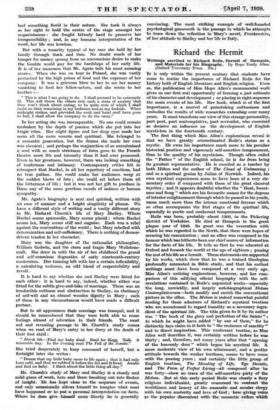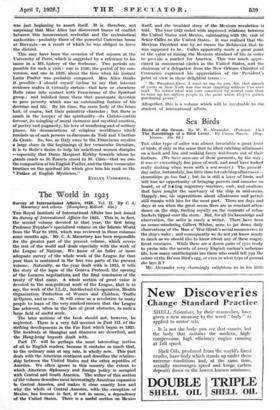Richard the Hermit
Writings ascribed to Richard Rolle, Hermit of Hampole, and Materials for his Biography. By Hope Emily Allen. . (Oxford University Press. 30s.)
Ir is only within the present century that students have come to realize the importance of Richard Rolle for the history both of English literature and English religion. ' Even so, the publication of Miss Hope Allen's monumental work gives us our first real opportunity of forming a just estimate of his character and development ; or placingin right sequence the main events of his life. Her book, which is of the first importance, is a marvel of painstaking enthusiasm and embodies the results of wide researches extending over many years. It must transform our view of this strange personality, part poet, part contemplative, part revivalist, who exercised so decisive an influence on the development of English mysticism in the fourteenth century.
The first thing which Miss Allen's explorations reveal is that we have greatly overestimated Rolle's status as a mystic. He owes his importance much more to his peculiar historical position and vigorously self-assertive temperament, than to the quality of his mysticism. Though often called the " Father " of the English school, he is far from being its_greatest - representative. He is excelled as :a teacher by both Hilton and the author of The Cloud of Unknowing ; and as a spiritual genius by Julian of Norwich. Indeed, his own mystical experiences seem to have been of a very ele- mentary order if compared with those of the great classical mystics ; and it appears doubtful whether the "Heat, Sweet- ness and Song " which are his favourite names for the degrees of interior enlightenment through which he passed in his youth, mean much more than the intense emotional fervour which so often accompanies the first stages of the spiritual life, especially in poetic and exuberant temperaments.
Rolle was born, probably about 1300, in the Pickering district of Yorkshire. He died at Hampole in the great plague year of 1349. So great was the veneration with which he was regarded in the North, that there were hopes of securing his canonization ; and an office was composed in his honour which has hitherto been our chief source of information for the facts of his life. It tells us •that he was educated at Oxford and forsook the world at the age of eighteen ; passing the rest of his life as a hermit. These statements are supported by his works, which show that he was a trained theologian profoundly interested in Bible study, and that his earliest writings must have been composed at a very early age. Miss Allen's untiring explorations, however, and her com- parison of this edifying official biography with the self- revelations contained in Rolle's imprinted works—especially the long, unwieldly, and largely autobiographical Melum Contemplativorum—both modify and enrich the conventional picture in the office. The Melons is indeed somewhat painful reading for those admirers of Richard's mystical treatises who are accustomed to regard humility as a necessary ingre- dient of the spiritual life. The title given to it by its author was " The book of the glory and perfection of the Saints " to which he might have added " by one of them," for he distinctly lays claim in it both to " the eminence of sanctity " and to direct inspiration. This exuberant treatise, as Miss Allen well describes it, was certainly written before he was thirty ; and, therefore, not many years after that " opening of the heavenly door " which began his mystical life. A more moderate view of his own attainment, and a gentler attitude towards the weaker brethren, seems to have come with the passing years ; and certainly the little group of English treatises, The Mending of - Life, Ego Dormio, and The Form of Perfect Living—all composed after he was forty—show no trace of the self-assertive piety of the Melum. But at this early period Rolle was clearly a fiery religious individualist, greatly concerned to contrast the worldliness and luxury of the monastic and secular clergy with his own austerity and love of God ; here giving voice to the popular discontent with 'the monastic orders which
was just beginning to assert itself. It is, therefore, not surprising that Miss Allen has discovered traces of conflict between this inconvenient revivalist and the ecclesiastical authoritic3 probably those of the powerful Cistercian house at Rievaulx—as a result of which he was obliged to leave the district.
This may have been the occasion of that sojourn at the University of Paris, which is suggested by a reference to his name in a MS. history of the Sorbonne. Two periods are possible for such a visit : one in 1820, the period of his con- version, and one in 1326, about the time when his learned Latin Psalter was probably composed. Miss Allen thinks it possible—I should myself incline to say that internal evidence makes it virtually certain—that here or elsewhere Rolle came into contact with Franciscans of the Spiritual group ; and imbibed from them that passionate devotion to pure poverty which was an outstanding feature of his doctrine and life. By his time, the main body of the friars had, of course, lost their primitive character ; but there is much in the temper of his spirituality—its Christo-centric fervour, its mingling of moral sternness and mystical emotion, of poetry and pugnacity, his love of wandering and of solitary places, his denunciations of religious worldliness which reminds us of such persons as Jaeopone da Todi and Ubertino da Casale. So, too, as Italy owes to the Franciscan mystics a large share in the beginnings of her vernacular literature, it is to Rolle's desire to help his unlettered women disciples —especially that Dame Margaret Kirkby towards whom he stands much as St. Francis stood to St. Clare—that we owe the composition of his English Psalter, and the three vernacular treatises on the spiritual life which give him his rank as the " Father of English Mysticism."
EVELYN UNDERHILL.







































 Previous page
Previous page